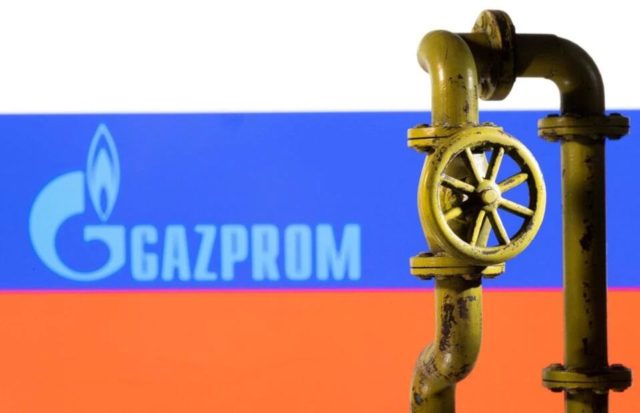European Union countries approved a weakened emergency plan to curb their gas demand on Tuesday, after striking compromise deals to limit the cuts for some countries, as they brace for further Russian reductions in supply.
By Kate Abnett
BRUSSELS, July 26 (Reuters) – European Union countries approved a weakened emergency plan to curb their gas demand on Tuesday, after striking compromise deals to limit the cuts for some countries, as they brace for further Russian reductions in supply.
Europe faces an increased gas squeeze from Wednesday, when Russian’s Gazprom has said it would cut flows through the Nord Stream 1 pipeline to Germany to a fifth of capacity.
With a dozen EU countries already facing lower Russian supplies, Brussels is urging member states to save gas and store it for winter for fear Russia will completely cut off flows in retaliation for Western sanctions over its war with Ukraine.
Energy ministers approved a proposal for all EU countries to voluntarily cut gas use by 15% from August to March.
The cuts could be made binding in a supply emergency, provided a majority of EU countries agree to this. But countries agreed to exempt numerous countries and industries from the binding 15% cut, after some governments opposed the EU’s original proposal to apply it to every country.
German Economy Minister Robert Habeck said the agreement would show Russian President Vladimir Putin that Europe remained united in the face of Moscow’s latest gas cuts.
“You will not split us,” Habeck said.
Hungary was the only country that opposed the deal, two EU officials said.
Russia’s Gazprom has blamed its latest reduction on needing to halt the operation of a turbine – a reason dismissed by EU energy chief Kadri Simson, who called the move “politically motivated”.
Simson said the agreement should ensure countries save enough gas to survive an average winter if Russia fully cut supplies now, but an unsually cold winter would require more severe measures.
Russia, which supplied 40% of EU gas before it invaded Ukraine, has said it is a reliable energy supplier. It also says the invasion, begun on Feb. 24, is a “special military operation”.
SOLIDARITY, SAVINGS
The EU deal would exempt from the binding 15% gas cut countries such as Ireland and Malta that are not connected to other member states’ gas networks.
Countries that meet an EU target for filling gas storage by August could face weaker targets – softening the cuts for roughly a dozen states, including Germany and Italy, based on current storage levels.
They can also exempt the gas they use in critical industries, such as energy-intensive steelmaking, from the target.
Those with a limited abillty to export gas to other EU countries can request a lower target, provided they export what they can. That could include Spain, which does not rely on Russian gas, and has said cutting its own demand would not help other countries since it lacks infrastructure capacity to share spare fuel.
“Everyone understands that when someone asks for help, you have to help,” Spanish Energy Minister Teresa Ribera said on Tuesday.
Italian Ecological Transition Minister Roberto Cingolani said the country’s binding target would be nearer 7% than 15%, once gas reductions it has already made compared with previous years were taken into account.
News of the latest drop in Russian supply has driven gas prices higher, adding to the cost of filling storage, while creating incentives to use less.
On Tuesday, the benchmark front-month Dutch contract rose more than 10% and is around 430% higher than a year ago.
The EU plan has tested countries’ solidarity. Poland approved the final deal, but Climate Minister Anna Moskwa said one country’s industry should not be forced to use less gas to help other states facing shortages.
Others were more positive, including Malta and Portugal – which both won softer targets in the negotiations. Maltese energy minister Miriam Dalli said the deal reflected countries’ varying energy situations.
“We managed to pass on a strong message of solidarity,” she said.
But some raised concern that the savings would still not be enough to avert a winter shortage. Levels vary between countries, but the EU has reduced its combined gas use by only 5%, despite months of soaring prices and dwindling Russian supplies.
“Fifteen percent will probably not be enough, given what the Russians have just announced,” Irish Environment Minister Eamon Ryan said.
– REUTERS








